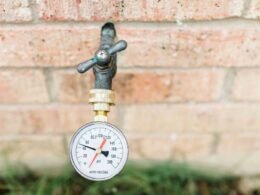Choosing the right water heater is a significant decision that can impact your home’s comfort, efficiency, and energy costs. An efficient water heater not only meets your family’s daily hot water needs but also helps you save on monthly utility bills. Whether you’re replacing an old unit or installing a new one, understanding the different types of water heaters and their unique benefits is essential for finding the best option for your household. This guide will walk you through the different types of water heaters, key factors to consider, and tips on selecting the ideal one for your home.
Types of Water Heaters
When it comes to water heaters, there’s no one-size-fits-all. Each type has its advantages and potential drawbacks, making it suitable for certain homes and needs. Let’s explore the main types of water heaters available.
Storage Tank Water Heaters
Storage tank water heaters are the traditional option found in many homes. They consist of a large tank that heats and stores water, ready to use whenever you need it. This type of water heater is straightforward and relatively affordable.
- Pros: They provide a steady supply of hot water and are typically more affordable upfront.
- Cons: They take up a lot of space, have limited hot water capacity, and can have higher standby energy losses, meaning they use energy to keep water hot even when it’s not in use.
Tankless (On-Demand) Water Heaters
Tankless water heaters, or on-demand water heaters, heat water only when needed, rather than storing it in a tank. When you turn on the hot water, cold water passes through a heating element or gas burner, heating it instantly.
- Pros: They are energy-efficient, take up less space, and provide endless hot water.
- Cons: Tankless heaters have a higher upfront cost and may struggle to meet the hot water demand of larger households, especially if multiple outlets require hot water simultaneously.
Heat Pump Water Heaters
Heat pump water heaters, also known as hybrid water heaters, use electricity to transfer heat from the air or ground to heat the water. They’re among the most energy-efficient options, using less electricity than traditional electric heaters.
- Pros: Very energy-efficient and environmentally friendly.
- Cons: They require a larger space with moderate temperatures to function effectively, so they may not be ideal for colder climates or smaller homes.
Solar Water Heaters
Solar water heaters use energy from the sun to heat water, offering an eco-friendly solution. They consist of solar panels, typically mounted on the roof, that absorb sunlight and transfer it to the water tank.
- Pros: They are highly energy-efficient and can significantly reduce utility costs in sunny climates.
- Cons: They come with a high upfront cost and are dependent on sunlight, which may not be ideal for all locations or climates.
Condensing Water Heaters
Condensing water heaters are high-efficiency units designed for homes that use natural gas as a primary energy source. These heaters capture exhaust gases that would typically escape and use them to heat water, making them an efficient choice. They’re also a smart option if you’re looking into how to decrease gas bill without compromising comfort. Investing in one can lead to long-term savings on energy costs.
- Pros: They offer high efficiency for gas-heated homes and can help save on energy bills.
- Cons: These models may have a higher price tag and require proper ventilation.
Key Factors to Consider
To choose the best water heater for your home, take the following factors into account:
Home Size and Hot Water Demand
Consider the size of your household and hot water needs. For example, a family of four might use 100 gallons of hot water daily, so selecting a model that meets this demand is crucial.
- Storage Tank Heaters: Check the tank capacity (measured in gallons) and recovery rate (how quickly it heats a new batch of water).
- Tankless Heaters: Look for a flow rate measured in gallons per minute (GPM). Choose a higher GPM if you have multiple hot water sources.
Energy Efficiency and Cost Savings
Choosing an energy-efficient water heater can lead to significant long-term savings. Look for the Energy Star rating, which indicates that the model meets energy efficiency standards.
Fuel Type
Different types of fuel can impact the water heater’s efficiency, operating cost, and environmental footprint. Common options include:
- Electricity: Available everywhere but can be costly for long-term use.
- Natural Gas: Cheaper than electricity in many areas but requires proper ventilation.
- Propane: An alternative to natural gas in areas without gas lines.
- Solar: Extremely energy-efficient but dependent on sunny climates.
Installation Space
Consider where you plan to install the water heater. Tankless models take up less space than storage tank units, while heat pump and solar heaters may need more room for equipment and access to air or sunlight.
Cost Considerations
Upfront Costs vs. Long-Term Savings
Water heaters vary in initial cost, with traditional storage tank models typically the most affordable and solar heaters the most expensive. However, high-efficiency models like heat pumps and solar options can lead to substantial long-term savings on energy bills.
Maintenance and Lifespan
Each type of water heater comes with different maintenance needs and lifespans.
- Storage Tank: Regular flushing is required to prevent sediment buildup, and the lifespan is usually around 10–15 years.
- Tankless: Minimal maintenance with a lifespan of 20 years or more.
- Heat Pump: Requires occasional filter cleaning and has a 10–15 year lifespan.
- Solar: High durability with proper maintenance, often lasting over 20 years.
Pros and Cons of Each Water Heater Type
To simplify your decision, here’s a quick summary:
- Storage Tank: Affordable but has standby heat loss.
- Tankless: Energy-efficient and space-saving but costly upfront.
- Heat Pump: Eco-friendly with energy savings but requires specific conditions.
- Solar: Very efficient in sunny areas but high installation cost.
- Condensing: Efficient for gas-heated homes but requires more investment.
Choosing the Right Size
Selecting the right size is essential to avoid running out of hot water or overspending on energy.
- For Tank Water Heaters: Multiply the number of people in your home by 10–15 gallons to estimate the tank size.
- For Tankless Water Heaters: Calculate the flow rate needed based on peak water usage, like showering and dishwashing simultaneously.
Environmental Impact and Sustainability
Eco-friendly water heaters like solar and heat pump models reduce carbon footprints by using renewable energy or lower electricity. Look for models with low emissions and high-efficiency ratings, such as Energy Star certified units, to make a sustainable choice.
Top Brands and Models to Consider
Some reputable brands to consider include:
- Rheem: Known for reliable, efficient models with options in all categories.
- AO Smith: Offers a range of high-efficiency heaters, especially for electric and hybrid models.
- Bosch: Known for high-quality tankless and solar options with energy-saving features.
- Bradford White: Durable and often recommended for gas models with robust warranties.
When choosing, check for models that offer warranties on tanks or heating elements, as these can protect your investment over the years.
Choosing the right water heater involves considering your household’s hot water needs, energy efficiency, budget, and available installation space. Each type of water heater comes with unique advantages, and finding the best fit will depend on your specific requirements. By carefully evaluating your options and factoring in long-term costs, you can select a water heater that ensures comfort and efficiency for years to come. And if you’re uncertain, consulting a professional can provide clarity and help ensure you make a choice that’s right for your home.










